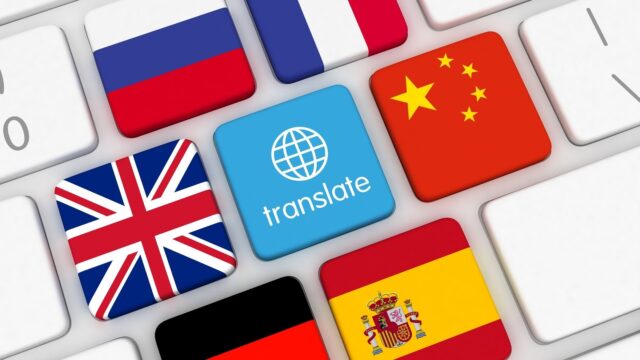
Translation in all businesses is super important because it helps communicate with people from diverse countries and backgrounds. When businesses translate their messages, it’s not just about changing the words into a different language. They also need to understand the culture of the people they’re talking to.
This means knowing their- traditions, beliefs, and how they do things. Businesses can ensure that their translated messages connect with people and not say anything that might upset them. It’s like building a bridge between languages and cultures so that everyone can understand each other and succeed.
Professional translation services are important to ensure the translation is accurate as they know all the little details and correct ways of saying things that make a big difference. It’s like having a special language superhero! Also, checking and fixing any mistakes in the translated text is super important. That way, everything sounds the same and makes sense. It’s like making sure all the puzzle pieces fit perfectly together.
Getting To Know Cultural Context

When a person translates things, it’s not just about changing the words from one language to another. They also have to think about the culture and how people in that culture think and do things. This is called the cultural context, and it’s really important for good translations. Here is why:
- Cultural context helps people understand the real meaning behind words. It’s like having a secret code that helps people know what people are trying to say.
- To understand the culture, one needs to do some research. This means learning about the special traditions, values, and customs of the people being talked to. It’s like discovering their special way of doing things.
- One big challenge is ensuring one doesn’t say or do anything that might upset or offend people from that culture. It’s like being super careful not to hurt anyone’s feelings accidentally.
- When a person translates, they must make sure the words and ideas are used to connect with the people they are talking to. It’s like speaking their language, not just with words but also with the things that matter to them, like their thoughts and feelings.
After understanding the cultural context, doing research, being careful not to make mistakes, and making sure the translations connect with people, one can help people better understand each other. It’s like building a special bridge between cultures so everyone feels heard and respected.
Following Localization And Adaptation

When translating content, it’s not just about changing words. Translators must think about the people they’re talking to and make sure the translations connect with them. Here’s a simple overview of this process-
- The content must be adapted to the language and the intended audience’s speech. It’s like speaking in their unique way, so they feel like the translation directly addresses them.
- Translators pay special attention to using words, phrases, and expressions that make sense to the target audience. It’s like using a special language that only they can fully understand.
- Using familiar measurements, currencies, and writing formats is important for helping the audience understand the information. This allows them to relate to the content and grasp it better.
- Visual elements, such as images and designs, are adjusted to match the cultural preferences of the target audience. It’s like presenting relatable visuals and evoking a sense of familiarity.
After localizing and adapting the content in these ways, translators ensure that their translations establish genuine connections with the intended audience. It’s like crafting a special message that promotes mutual understanding and connection.
Best Practices For Clear & Consistent Communication In Translation

Regarding translation- it’s important to communicate clearly and keep things consistent. The translated materials should be easily understood with clear words and phrases. It’s like talking in a way that everyone can follow along. Keeping everything consistent, like the brand’s style and tone, ensures the message is the same in different languages.
- Legal and technical things are also important in business translation. Making sure to follow the rules and laws is a must to avoid any problems. Translating legal documents correctly is important to ensure everything is fair and understood. And when it comes to technical words or things, it’s important to explain them in a way everyone can understand, no matter their language.
- Working together and talking with the translators is super important too. Building a good relationship, giving them information about what you want, and listening to their feedback improve the translations. It’s like being a team and helping each other out.
- Learning and improving are things that should never stop. It’s important to keep up with the latest trends, changes, and new tools that can make translations even better. Asking people who use the translations for their thoughts and looking at how well the translations work helps improve things.
After following these tips in this direction, businesses can talk to different people all over the world. Good translations help everyone understand each other and do business together. It’s like opening doors and making the world a smaller place where everyone can succeed.
Collaboration And Communication With Translators

Collaboration and communication are key to successful translations when working with translators. Here’s a detailed look at how to refine or enhance one’s effective collaboration:
- Building strong relationships with translators is important. It involves establishing rapport and trust, which leads to better understanding and cooperation.
- Providing context and background information to translators is crucial. This helps them grasp the purpose, tone, and intended message of the content, resulting in more accurate translations.
- Encouraging open communication and feedback promotes a healthy working relationship. Translators should feel comfortable asking questions and sharing their insights to ensure clarity and precision in the translations.
- Addressing questions and clarifications promptly is essential. It helps avoid misunderstandings and allows for timely resolution of any uncertainties or ambiguities.
Collaboration, continuous learning, and improvement are also necessary in the field of translation. Some important tips are mentioned below-
- Staying updated on language trends and changes help translators maintain their linguistic proficiency. It helps that translations reflect the most current usage and expressions.
- Seeking feedback from international customers provides valuable insights into the effectiveness of translations. Customer input helps pinpoints areas for improvement and enhances the quality of future translations.
- Evaluating translation performance enables translators to assess their work objectively. It helps and allows them to know strengths and weaknesses, leading to targeted improvements.
- Including new translation techniques and technologies keeps translators ahead in their field- Understanding innovative tools and methods increases efficiency and accuracy in the whole translation process.
Conclusion
Following these tips for successful translation in international business is beneficial for building strong relationships, providing context, encouraging communication, and addressing questions ethically. Businesses can achieve accurate and culturally sensitive translations.
In addition – continuous learning, seeking feedback, evaluating performance, and embracing new techniques contribute to ongoing improvement. Effective translation has the power to break boundaries and help encourage global business success while promoting mutual understanding in an interconnected world.








